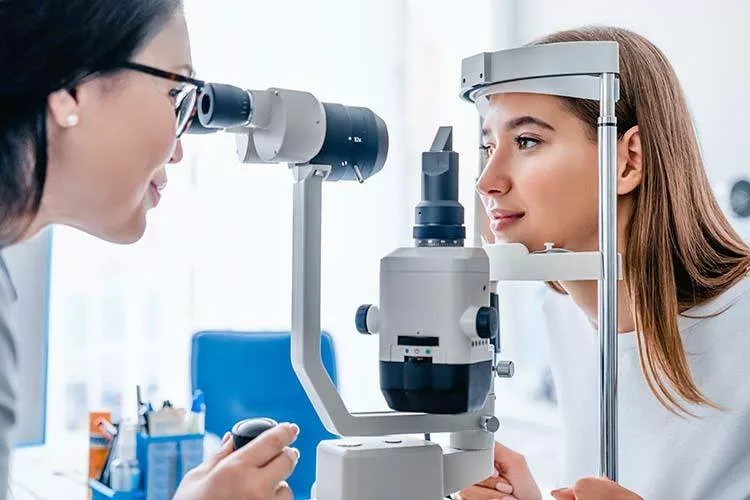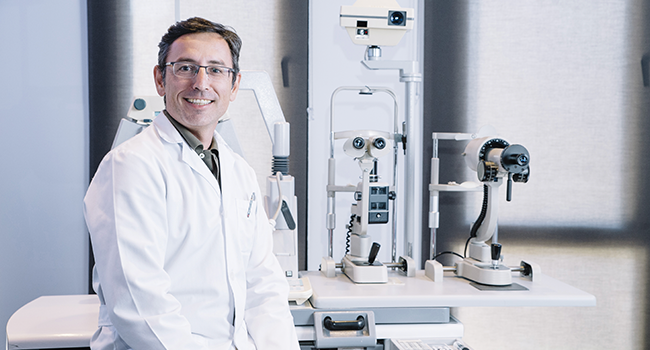Get Exceptional Treatment from a Skilled Ophthalmologist in Nabua Today
Recognizing the Duty of an Ophthalmologist in Eye Treatment
The duty of an ophthalmologist in eye care is diverse, encompassing both the diagnosis and therapy of a large range of eye conditions. These medical specialists are not only experienced at conducting detailed eye examinations but likewise possess the expertise to recognize systemic wellness concerns that might show up through aesthetic signs. Provided the occurrence of eye problems such as glaucoma and cataracts, recognizing the breadth of an ophthalmologist's responsibilities comes to be vital. Lots of people remain not aware of the crucial aspects of eye health and wellness management that might dramatically influence their top quality of life. What could be missing from this necessary conversation?

What Is an Ophthalmologist?
Although lots of people might perplex eye doctors with eye doctors or opticians, an ophthalmologist is a clinical doctor specializing in the medical diagnosis and treatment of eye problems and conditions. ophthalmologist in nabua. This specialization needs comprehensive education, consisting of completing a bachelor's level, complied with by medical school, and a residency in ophthalmology
Ophthalmologists are outfitted to handle a vast array of problems, from common refractive errors to intricate medical treatments. They have an extensive understanding of the anatomy and physiology of the eye, enabling them to identify problems such as glaucoma, cataracts, and macular degeneration.
Along with clinical management, several ophthalmologists perform surgical treatments, such as cataract removal or laser treatments for refractive errors. This twin capability of offering both medical and medical treatment distinguishes them from other eye care specialists.

Trick Responsibilities of Ophthalmologists
The primary obligations of eye doctors encompass a wide range of jobs vital for preserving and enhancing eye wellness. They conduct thorough eye examinations to examine visual skill and identify different ocular conditions, using innovative analysis tools and methods. This includes translating imaging research studies and doing specialized tests to review the framework and function of the eye.
Ophthalmologists are also accountable for recommending rehabilitative lenses, medications, and non-surgical interventions to take care of eye problems properly. In instances needing surgical intervention, they carry out a range of treatments, varying from laser treatments to intricate surgeries focused on remedying refractive mistakes or attending to a lot more serious ocular illness.
Individual education and learning is an additional critical facet of their duty. Eye doctors educate patients regarding preventative procedures, therapy choices, and possible threats related to eye wellness. They also work together with various other health care professionals to make sure detailed take care of patients with systemic conditions that may affect vision.
In addition, they remain abreast of the most recent advancements in ophthalmology through continual education and learning and research study, guaranteeing they provide the most efficient, evidence-based treatment. Via these varied responsibilities, ophthalmologists play a critical function in safeguarding and improving the vision and overall eye health and wellness of their clients.
Common Eye Conditions Treated
Ophthalmologists frequently come across a variety of usual eye conditions that need their experience for effective administration and treatment. One prevalent problem is refractive mistakes, which include nearsightedness, hyperopia, and astigmatism. These mistakes can frequently be remedied with glasses, call lenses, or refractive surgery.
One more significant problem is cataracts, characterized by the clouding of the eye's lens, leading to blurry vision. Surgical intervention is commonly needed to eliminate the cataract and bring back clearness. Glaucoma, a leading reason of blindness, includes boosted intraocular pressure, demanding normal surveillance and possible surgical or medicinal therapy to protect vision.
In addition, age-related macular degeneration (AMD) affects the main section of the retina, impacting comprehensive vision. Monitoring might include way of living alterations and, in some cases, laser treatment or shots. Diabetic retinopathy, a complication of diabetic issues, can result in vision loss if left unattended; informative post careful surveillance and prompt treatment are vital.
The Value of Regular Eye Tests
Normal eye tests play an essential function in maintaining overall eye health and wellness and identifying potential troubles early. Several eye conditions, such as glaucoma, macular deterioration, and diabetic person retinopathy, can create without obvious signs until considerable damages has actually occurred. Routine examinations make it possible for ophthalmologists to determine these concerns at their start, enabling prompt treatment that can prevent vision loss.
During an eye examination, an ophthalmologist reviews aesthetic acuity, evaluates the wellness of the eye's inner frameworks, and look for any kind of problems. These assessments are crucial not only for identifying eye-related issues however also for determining systemic health conditions that might show up through ocular signs, such as hypertension or diabetes mellitus.
The regularity of eye tests can vary based on age, risk aspects, and existing wellness problems. Eventually, focusing on eye tests promotes aggressive administration of eye health, guaranteeing that any possible concerns are attended to quickly, consequently maintaining vision and boosting high quality of life.
Exactly How to Pick an Ophthalmologist
Selecting an ophthalmologist is a critical decision that can significantly influence your eye health and wellness and overall wellness. When picking an ophthalmologist, consider their certifications, experience, and areas of specialization. ophthalmologist in nabua. Ensure they are board-certified and have actually completed the necessary training in ophthalmology, which generally consists of a medical level and numerous years of residency
References from your medical care physician or trusted pals can give useful understandings into possible prospects. Additionally, researching online reviews and individual testimonies can help evaluate the eye doctor's track record within the area. Assess the ophthalmologist's experience with details conditions or treatments relevant this website to your requirements, such as cataract surgical procedure, glaucoma administration, or pediatric eye care.
Location and ease of access are also crucial factors; choose an eye doctor whose office is conveniently located and provides about his versatile hours. Ultimately, choosing an ophthalmologist who straightens with your medical care demands and personal comfort can promote a favorable long-lasting partnership focused on maintaining your eye health and wellness.
Conclusion
In final thought, ophthalmologists serve an important function in eye treatment through their comprehensive training and knowledge. Picking a qualified ophthalmologist is critical for receiving appropriate care and maintaining ideal eye health and wellness throughout one's life.